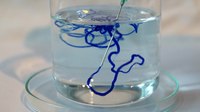
Reducing Agent‐Mediated Nonenzymatic Conversion of 2‐Oxoglutarate to Succinate: Implications for Oxygenase Assays
Sign Up to like & getrecommendations! Published in 2020 at "Chembiochem"
DOI: 10.1002/cbic.202000185
Abstract: l‐Ascorbate (l‐Asc) is often added to assays with isolated FeII‐ and 2‐oxoglutarate (2OG)‐dependent oxygenases to enhance activity. l‐Asc is proposed to be important in catalysis by some 2OG oxygenases in vivo. We report observations on the… read more here.
Keywords: nonenzymatic conversion; reducing agent; agent mediated; succinate ... See more keywords

Electroless deposition of pure copper film on carbon fabric substrate using hydrazine as reducing agent
Sign Up to like & getrecommendations! Published in 2017 at "Journal of Materials Science: Materials in Electronics"
DOI: 10.1007/s10854-017-7234-6
Abstract: We report on a simple but efficient strategy for the fabrication of conductive copper/carbon fabric composites by electroless plating method. The carbon fabric was firstly treated by cleaning, etching, sensitization, and activation processes. Hydrazine hydrate… read more here.
Keywords: copper film; reducing agent; copper; carbon fabric ... See more keywords

Sodium cholate as efficient green reducing agent for graphene oxide via flow reaction for flexible supercapacitor electrodes
Sign Up to like & getrecommendations! Published in 2019 at "Journal of Materials Science: Materials in Electronics"
DOI: 10.1007/s10854-019-02275-z
Abstract: In this work, sodium cholate (NaC) was used as novel green reducing agent for graphene oxide (GO) reduction at 90 °C and short synthesis time using a continuous segmented flow reaction system. As a comparison,… read more here.
Keywords: graphene oxide; green reducing; agent graphene; reducing agent ... See more keywords

Evaluation of Molasses as a Green Reducing Agent in Sulfur Dyeing
Sign Up to like & getrecommendations! Published in 2020 at "Fibers and Polymers"
DOI: 10.1007/s12221-020-1231-8
Abstract: The aim of coloration for a textile material is to achieve high-quality dyed fabric with good levelness, fastness, and ecological and economical process. In this study, the potential use of molasses as an ecological reducing… read more here.
Keywords: green reducing; agent; molasses green; agent sulfur ... See more keywords

Correlating the strength of reducing agent adsorption with Ag/Al2O3 catalyst performances in selective catalytic reduction (SCR) of NOx
Sign Up to like & getrecommendations! Published in 2021 at "Catalysis Today"
DOI: 10.1016/j.cattod.2021.01.013
Abstract: Abstract NMR relaxation has been used to characterise the strength of surface interaction of reducing agent species in Ag/Al2O3 catalysts used for the selective catalytic reduction (SCR) of NOx. Several classes of compounds, including aliphatic… read more here.
Keywords: selective catalytic; scr; catalyst; strength ... See more keywords

Screening of zero valent mono/bimetallic catalysts and recommendation of Raney Ni (without reducing agent) for dechlorination of 4-chlorophenol.
Sign Up to like & getrecommendations! Published in 2020 at "Chemosphere"
DOI: 10.1016/j.chemosphere.2020.126298
Abstract: Chlorophenol (CP) is considered as environmentally hazardous material due to its acute toxicity, persistent nature and strong bioaccumulation. The dechlorination of 4-CP was investigated by using various catalysts such as bimetallic (Fe0/Cu0, Al0/Fe0), Pd/C, Raney… read more here.
Keywords: agent dechlorination; reducing agent; raney; dechlorination ... See more keywords

Au/Ag nanoparticles-decorated TiO2 with enhanced catalytic activity for nitroarenes reduction
Sign Up to like & getrecommendations! Published in 2021 at "Colloids and Surfaces A: Physicochemical and Engineering Aspects"
DOI: 10.1016/j.colsurfa.2021.126614
Abstract: Abstract A straightforward and environmentally-friendly approach for the fabrication of TiO2 supported nano-Au and Ag catalysts with enhanced activity in nitroarenes reduction is presented. The immobilization of the metal nanoparticles (NPs) onto TiO2 was performed… read more here.
Keywords: activity nitroarenes; tio2; onto tio2; nitroarenes reduction ... See more keywords

An improved process methodology for extracting cobalt from zinc plant residues
Sign Up to like & getrecommendations! Published in 2020 at "Hydrometallurgy"
DOI: 10.1016/j.hydromet.2019.105163
Abstract: Abstract Zinc plant residue contains valuable metals that can be reused as a source for obtaining these metals. This paper describes the use of sodium thiosulfate (Na2S2O3) in leaching of Co and Mn from zinc… read more here.
Keywords: methodology; zinc; reducing agent; zinc plant ... See more keywords

Reducing agent-free formation of Cu(I) nanoclusters on gC3N4 for enhanced photocatalysis
Sign Up to like & getrecommendations! Published in 2017 at "Journal of Alloys and Compounds"
DOI: 10.1016/j.jallcom.2017.04.302
Abstract: Abstract Copper species with +1 oxidization state, Cu(I), in amorphous form can potentially be employed for photocatalytic activity improvement due to its ability to capture photoproduced hole. However, this proposition has never been confirmed experimentally, likely… read more here.
Keywords: photocatalytic activity; reducing agent; free formation; agent free ... See more keywords

Carbon monoxide as a selective reducing agent in organic chemistry
Sign Up to like & getrecommendations! Published in 2018 at "Mendeleev Communications"
DOI: 10.1016/j.mencom.2018.03.001
Abstract: Carbon monoxide as an example of reducing agent, in contrast to classical reducing agents (hydrogen and metal hydrides), can provide very high atom precision for reductive addition of substrates with various functional groups. This enables… read more here.
Keywords: monoxide selective; selective reducing; chemistry; reducing agent ... See more keywords

Synthesis of copper and copper oxide nanoparticles with different morphologies using aniline as reducing agent
Sign Up to like & getrecommendations! Published in 2021 at "Solid State Communications"
DOI: 10.1016/j.ssc.2021.114364
Abstract: Abstract Copper nanoparticles (CuNPs) are synthesized by chemical reduction of CuSO4·5H2O salt in presence of aniline as reducing agent. The effects of CuSO4·5H2O concentration, reaction temperature, molar ratio of [aniline]/[CuSO4·5H2O], reaction media and presence of… read more here.
Keywords: cuso4 5h2o; copper; ethylene glycol; reducing agent ... See more keywords